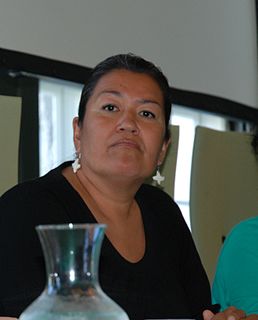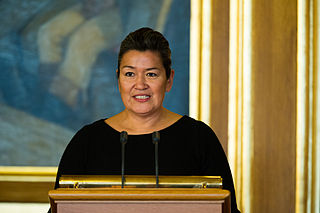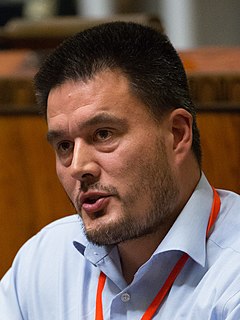
Hans Enoksen is a Greenlandic politician who served as the third Prime Minister of Greenland from 2002 to 2009.
Siumut is a social-democratic political party in Greenland. The party was an observer affiliate of the Socialist International. Siumut is led by the current Greenlandic Premier Kim Kielsen. Until September 2014 it was led by Aleqa Hammond, who was the first woman to lead the party.
The Democrats is a liberal and unionist political party in Greenland.

Prior to its secession from the European Community in 1985, Greenland was a constituency of the European Parliament for European elections.
The Greenlandic European Communities membership referendum, 1982 was a referendum over whether Greenland should continue to be a member of the European Economic Community which took place on 23 February 1982.
General elections were held in Greenland on 2 June 2009. Prime Minister Hans Enoksen announced the election date on 15 April 2009, stating that he would prefer for a newly elected parliament to administer Greenland when the self-government reform takes effect on 21 June 2009. The reform gave more power to the Greenlandic parliament with decisions on most issues being devolved to the parliament but defence and foreign affairs remaining under the control of Denmark.
The Naalakkersuisut is the government of Greenland, a "constituent country" of the Kingdom of Denmark, takes place in a framework of a parliamentary representative democratic country, whereby the prime minister is the head of government, and of a multi-party system. Executive power is exercised by the government. Legislative power is vested in both the government and parliament Inatsisartut. The judiciary is independent of the executive and the legislature. Greenland has full autonomy on most matters, except on policies and decisions affecting the region including negotiations with the devolved legislatures and the Folketing.

General elections were held in Greenland on 12 March 2013. The opposition Siumut party emerged as the largest in Parliament, winning 14 of the 31 seats. On 26 March Siumut leader Aleqa Hammond became Greenland's first female Prime Minister.

Aleqa Hammond is a Greenlandic politician and member of the Danish Folketing (parliament). Formerly the leader of the Siumut party, she became Greenland's first female Prime Minister after her party emerged as the largest parliamentary faction in the 2013 elections. In 2014 she stepped down as Prime Minister and leader of Siumut, following a case of misuse of public funds. She was expelled from Siumut on 23 August 2016 after yet another case of misuse of public funds and became an independent. On 31 March 2018 she announced that she is running in the 2018 Greenlandic parliamentary election for the Siumut breakaway Nunatta Qitornai.
General elections were held in Greenland on 3 December 2002. The result was victory for the Siumut party, which won 10 of the 31 seats in the Parliament.
General elections were held in Greenland in April 1983. Siumut and Atassut both won 12 seats in the 26-seat Parliament.
General elections were held in Greenland on 6 June 1984. Siumut and Atassut both won 11 seats in the 25-seat Parliament. The elections were held part-way through the negotiations of Greenland's exit from the European Economic Community.
General elections were held in Greenland on 26 May 1987. Siumut and Atassut both won 11 seats in the 26-seat Parliament.
General elections were held in Greenland in 5 March 1991. Siumut emerged as the largest party in the Parliament, winning 11 of the 27 seats.
General elections were held in Greenland on 4 March 1995. Siumut remained the largest party in the Parliament, winning 12 of the 31 seats.
General elections were held in Greenland on 16 February 1999. Siumut remained the largest party in the Parliament, winning 11 of the 31 seats.

Early general elections were held in Greenland on 28 November 2014. They were called after Prime Minister Aleqa Hammond resigned following a spending scandal. Siumut and Inuit Ataqatigiit emerged as the largest parties both winning 11 of the 31 seats. A three party coalition government was formed consisting of the incumbent Siumut and Solidarity parties alongside the Democrats.

Partii Naleraq is a centrist-populist political party in Greenland.

Atassut is a liberal-conservative and unionist political party in Greenland. Founded on 29 April 1978, Atassut is an established partner of the Liberal Party of Denmark.
General elections were held in Greenland on 24 April 2018, electing all 31 members of Parliament. The elections were required to be held no later than 26 November 2018, four years after the previous elections on 27 November 2014, but Prime Minister Kim Kielsen chose to call the elections seven months early. His Siumut party remained the largest in Parliament, but lost two seats, whilst Inuit Ataqatigiit, the second-largest party, lost three seats. The smaller Democrats and Partii Naleraq gained seats, with the newly formed Cooperation Party and Nunatta Qitornai parties both entering Parliament.









